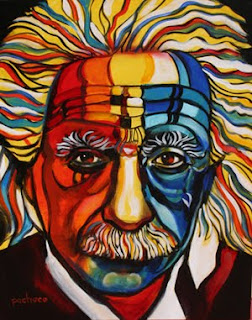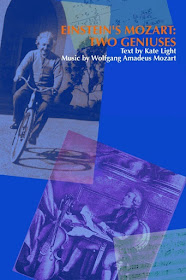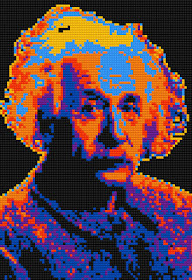



"The only escape from the miseries of life
are music and cats..."
~Albert Einstein~


~Albert Einstein~


"It occurred to me by intuition,
and music was the driving force behind that intuition.
My discovery was the result of musical perception.
My parents had me study the violin from the time I was six.
My new discovery is the result of musical perception."
~Albert Einstein~

A table, a chair, a bowl of fruit and a violin;
what else does a man need to be happy?
~Albert Einstein~

~Albert Einstein~

INFORMATION FROM:
January 31, 2006
Essay
A GENIUS FINDS INSPIRATION
IN THE MUSIC OF ANOTHER
By Arthur I. Miller
Last year, the 100th anniversary of E=mc2
inspired an outburst of symposiums, con-
certs,essays and merchandise featuring Albert
Einstein. This year, the same treatment is be-
ing given to another genius, Wolfgang
Amadeus Mozart, born on Jan. 27, 250 years
ago. There is more to the dovetailing of these
anniversaries than one might think.

Einstein once said that while Beethoven
created his music, Mozart's
"was so pure that it seemed to have been ever-present in
the universe, waiting to be discovered by the master."
Einstein believed much the same
which, he wrote, revealed a "pre-established harmony"
exhibiting stunning symmetries. The laws of nature,
such as those of relativity theory, were waiting to be
plucked out of the cosmos by someone with a
sympathetic ear. Thus it was less laborious
calculation, but "pure thought" to which
Einstein attributed his theories.

Einstein was fascinated by Mozart and sensed
an affinity between their creative processes,
as well as their histories.

as well as their histories.

As a boy Einstein did poorly in school. Music
was an outlet for his emotions. At 5, he began
violin lessons but soon found the drills so try-
ing that he threw a chair at his teacher, who
ran out of the house in tears. At 13, he
discovered Mozart's sonatas.

discovered Mozart's sonatas.

WOLFGANG AMADEUS MOZART
THE VIOLIN SONATAS
Henryk Szeryng, Violin
Ingred Haebler, Piano
Ingred Haebler, Piano
The result was an almost mystical connection,
said Hans Byland, a friend of Einstein's
from high school.
"When his violin began to sing,"
Mr. Byland told the biographer Carl Seelig,
"the walls of the room seemed to recede; for the first time,
Mozart in all his purity appeared before me, bathed in Hellenic
beauty with its pure lines, roguishly playful, mightily sublime."
beauty with its pure lines, roguishly playful, mightily sublime."
in his spare time. But he was also nourish-
ed by music, particularly Mozart. It was
at the core of his creative life.
And just as Mozart's antics shocked his
contemporaries, Einstein pursued a notably
Bohemian life in his youth. His studied in-
difference to dress and mane of dark hair,
along with his love of music and philosophy,
made him seem more poet than scientist.
He played the violin with passion and often
performed at musical evenings. He en-
chanted audiences, particularly women,
one of whom gushed that
"he had the kind of male beauty
that could cause havoc."
 He also empathized
He also empathized



with Mozart's ability to continue to
compose magnificent music even in very
difficult and impoverished conditions. In 1905,
the year he discovered relativity,

Einstein was
living in a cramped apartment
That spring he wrote four papers that were
destined to change the course
of science and nations.
grew in part from aesthetic discontent. It
seemed to him that asymmetries in physics
concealed essential beauties of nature;
existing theories lacked the "architecture"
and "inner unity" he found in the
music of Bach and Mozart.
In his struggles with extremely complicated
mathematics that led to the general theory
of relativity of 1915, Einstein often turned
for inspiration to the simple beauty
of Mozart's music.
"Whenever he felt that he had come to the end of the road or into
a difficult situation in his work, he would take refuge in music,"
recalled his older son, Hans Albert.
 |
| (Left) Hans Albert Einstein and (Right) Albert Einstein |
"That would usually resolve
all his difficulties"
all his difficulties"

"Hardly anyone who has truly understood it will
be able to escape the charm of this theory,"
he once said.

The theory is essentially one man's view of
how the universe ought to be. And amazingly,
the universe turned out to be pretty much as
Einstein imagined. Its daunting mathematics
revealed spectacular and unexpected
phenomena like black holes.

phenomena like black holes.

Though a Classical giant, Mozart helped lay
groundwork for the Romantic with its less
precise structures. Similarly, Einstein's
theories of relativity completed the era of
classical physics and paved the way for
atomic physics and its ambiguities.
atomic physics and its ambiguities.
 |
| Julliard String Quartet The original members of the quartet: violinists Robert Mann and Robert Koff, violist Raphael Hillyer, and cellist Arthur Winograd  |
recalled having played
for Einstein at his home
in Princeton, N.J.
in Princeton, N.J.
 |
| In Front of his Princeton Home, c. 1950 |
They had taken quartets by
Beethoven and Bartok and two
Mozart quintets, said the first violinist,
Robert Mann, whose remarks were
recorded by the scholar Harry Woolf.
After playing the Bartok,
Mann turned to Einstein.
"It would give us great joy,"he said,
"to make music with you."
musicians had taken an extra. Einstein
chose Mozart's brooding Quintet in G minor.
 |
| Leonid Pasternak: Albert Einstein, Berlin 1927 |
WOLFGANG AMADEUS MOZART
STRING QUINTET
IN G MINOR, K.516
Budapest String Quartet
the notes on the musical score,"
Mr. Mann recalled, adding,
"while his out-of-practice hands were fragile, his coordin-
ation, sense of pitch, and concentration were awesome."
He seemed to pluck Mozart's
VTHron in Music, August 19th, 2008
EINSTEIN AND WHAT MUSIC
DID FOR HIS GENIUS

Say, "genius" and his name immediately
pops up to mind. Einstein is the closest
you get to describing genius, even small
kids know him. There is no other person-
ality in the academic world that is even
half Einstein's popularity.

half Einstein's popularity.

There is no genius in the world as revered
and as loved as Albert Einstein.
His picture with his distinctive hairstyle
even became a pop culture
icon that kids won't
mind lugging around.

mind lugging around.

No where in the world could we find another
academic that rivals the popularity of rock
superstars. His opus "E=mc2" would rival
any Beatles' platinum-record, his "Theory
of Relativity" even shook Newton's gravita-
tional theory off the charts.

tional theory off the charts.

Kids would love him more if they would know
that this dude also dug music. Had he lived
later, he could easily pass as an only male
member of that Bond electric quartet. Wouldn't
it be a blast seeing Einstein jamming Mozart
up on electric violin with these gorgeous girls?
up on electric violin with these gorgeous girls?

He once confided that had he not been a
scientist, he would have been a musician.
Mostly favoring classical music, Einstein a-
dored Mozart and worshiped Bach.
"Life without playing music
is inconceivable for me,"
He also said that he lives his day-
dreams in music, and
"I get most joy in life out of music."

Our Einstein, with unclipped moustache
and unkept do, did actually perform
in solo concerts (and with others)!

Einstein, Too Stupid to Learn

in solo concerts (and with others)!

Einstein, Too Stupid to Learn

There's a little known fact about our great
genius: Einstein did extremely poorly in
school when he was young. So academical-
ly poor he was, that his grade school teachers
asked his parents to take him out of school
because he was "too stupid to learn"--our
Einstein, too stupid to learn!
Einstein, too stupid to learn!
The teachers thought it would
be easier for Einstein's parents
to make him learn manual
labor so he could survive in life.
Instead of heeding, Albert's
parents bought him a violin
(he actually started playing
the violin at age six).
Let us fast-forward to today's
studies, on how music makes
kids bright, for reference.

An article in the Brain and Mind
website sums it all up as:
"The power of music to affect memory is quite intriguing.
Mozart's music and baroque music, with a 60 beats per
minute beat pattern, activate the left and right brain. The
simultaneous left and right brain action maximizes learning
and retention of information. The information being studied
activates the left brain while the music activates the right
brain. Also, activities which engage both sides of the brain
at the same time, such as playing an instrument or singing,
causes the brain to be more capable of processing information."
Music helped bring out the real genius in
our Einstein. Albert Einstein himself admitted
that the reason he was so smart was be-
cause he played the violin.


One friend, G.J. Withrow,
confided that the way Einstein dealt
with problems and equations was by
improvising on the violin.

Get this interesting article by Brian Foster, an
experimental particle physicist at the Depart-
ment of Physics, Oxford University, UK, that
we dug from the archives of the Johns
Hopkins University website.
EINSTEIN'S UNIVERSE:
THE SCIENTIST,
THE MAN,
THE MUSICIAN
THE MUSICIAN



WHEN WORLDS COLLIDE:
PHYSICS MEET MUSIC
https://www.youtube.com/watch?v=oer7JgH-DEo#t=32
PHYSICS MEET MUSIC
https://www.youtube.com/watch?v=oer7JgH-DEo#t=32
It reveals that
Einstein's second wife, Elsa,
who confided that she first
fell in love with Einstein because of the way
he plays Mozart beautifully on the violin,
said Einstein also plays the piano
(his mom was a pianist).
"Music helps him when he is thinking about his theories. He
goes to his study, comes back, strikes a few chords on
the piano, jots something down, returns to his study."
It would also be interesting to note that there
are relaxation music that would also do the
exact opposite effect to the brain. Several
studies conducted, revealed that certain
music (esp. baroque classics) such as Bach's
and Mozart's, helped students score better
at tests, and relaxation sounds or silence
make them score lower.



Today, students, professionals, artists, or
practically anyone can make use of brain
performance-enhancers like iMusic. Based
on scientific research, iMusic is proven to train
your brain, improve your focus, memory, IQ,
and to help you lower your brain age.


LINKS

http://www.dailyprincetonian.com/2005/11/14/13792/
http://thinkexist.com/quotation/if_i_were_not_a_physicist-i_would_probably_be_a/12641.html
http://www.goodreads.com/quotes/45104-it-occurred-to-me-by-intuition-and-music-was-the
http://www.goodreads.com/quotes/108631-the-only-escape-from-the-miseries-of-life-are-music


http://www.shankarmahadevanacademy.com/community/articles/view/2/

http://www.goodreads.com/quotes/108631-the-only-escape-from-the-miseries-of-life-are-music


http://www.shankarmahadevanacademy.com/community/articles/view/2/

http://www.brainyquote.com/quotes/quotes/a/alberteins148867.html
http://www.fas.harvard.edu/~hsdept/bios/docs/einstein_rev.pdf
http://www.einsteinsworld.com/Albert-Einstein-Press-Photos-1930-Violin-HebewUniversity.htm
http://www.oxfordtoday.ox.ac.uk/features/when-music-gets-physical

http://www.oxfordtoday.ox.ac.uk/features/when-music-gets-physical

About the frugality of his father's lifestyle:
"What do I need? Bed, table, chair, paper, pencil,
and later a manuscript and, importantly, the violin.
Everything else is ballast."
~Hans Albert Einstein~
~Hans Albert Einstein~
ALBERT EINSTEIN:
HOW I SEE THE WORLD



Andy Warhol: Einstein


EINSTEIN ON THE BEACH
1984 Philip Glass Documentary

EINSTEIN ON THE BEACH
Philip Glass
 |
| Philip Glass |



EINSTEIN ON THE BEACH
Counting Crows















































































